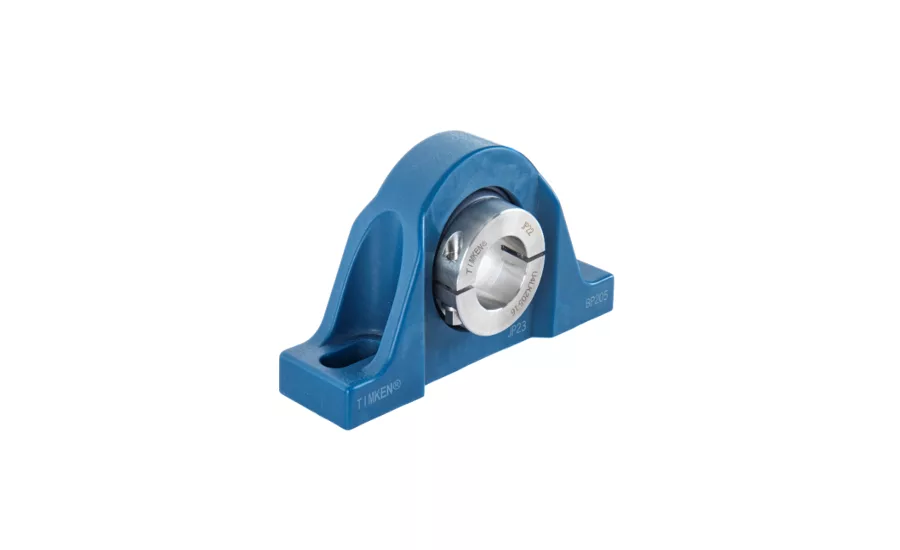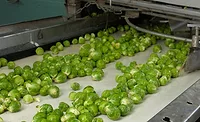Washed out: Why stronger bearings are key to improving food safety and process reliability

Here’s food for thought—even one damaged bearing can bring a food or beverage plant to a standstill. A typical processing or packaging facility might house equipment containing thousands of bearings in total, and the threat of a contamination from a single bearing that is purging grease might be enough to shut down a conveyor line. Other times, protective bearing unit covers can come loose or go missing to the alarm of maintenance managers. A highly corroded bearing meanwhile, is unsightly at best, a potential risk to food integrity at worst, and unlikely to escape the attention of a safety inspector in any event.
Bearings have a tough job to do in all types of equipment, and few environments are harder on mechanical components than food and beverage plants. Wet, humid conditions constantly challenge plant operators to keep machines rust-free while sanitization requirements can mandate daily cleanings, meaning some bearings never get a break from repeated exposure to corrosive acids and alkalis, as well as high-pressure water jets.
Many plants operate around-the-clock leaving little time or patience for unscheduled maintenance. Importantly, bearings must achieve their target life while ensuring the highest level of food safety despite unusual demands. The Timken Company has engineered bearings for critical industries for over a century, including bearings that follow hygienic design principles, and offers a closer look at how food producers and OEMs can optimize their machines so that bearings do not become a source of concern.
It’s hard being a bearing
Washdown can present a steep challenge to reliable bearing performance at each stage of production. As one example, imagine a sleeve filling system that is subject to daily cleaning. As workers spray down the equipment using industrial pressure washers, bearings are exposed to gallons of hot water that may be pressurized to over 1,500 psi. Often this involves a shower of caustic cleaners and detergent foam as well as chlorinated sanitizers.
Cleaning agents can be particularly harmful to bearing lubricants. Some producers have turned to organic solvents to aid in dissolving food particles. If forced past the bearing seals, these solvents can break down the lubricating oils. As oils are dissolved away, bearing wear can ensue, and often leads to corrosion.
In some cases, bearing seals simply cannot stand up to high-pressure sprays, and while plant workers may treat bearings with care, they might be unaware of how easily seal damage can occur and how water and contaminants can be forced into otherwise clean bearings.
Looking for quick answers on food safety topics?
Try Ask FSM, our new smart AI search tool.
Ask FSM →
These scenarios play out daily in facilities where equipment like mixers, emulsifiers, deboners, tumblers, slicers, breaders and chillers must be maintained to strict FDA and USDA requirements, among other rigid standards set forth by the Food Safety Modernization Act. As many have already learned, stronger bearings are one key to developing a more effective prevention-based food safety system.
The cost of corrosion
Another challenge for food processors is understanding how certain bearing materials will react to different combinations of chemical agents that can be encountered in a facility. Many processing and cleaning chemicals are highly acidic while others are highly alkaline. In either case, these chemicals can attack high-carbon stainless steel (one of the most used materials for bearings), leading to corrosion.
Complicating matters is the fact many machine bearings are difficult to access, making close inspection a challenge—a small spot of rust on the underside of a bearing, for instance, can be easily overlooked.
Particularly in meat processing plants, USDA inspectors are quick to notice any signs of corrosion or rust. Often, this results in a mandate to replace affected machine components to remedy the situation. The reality is that while preventing all corrosion is impractical, there is ample opportunity for food makers to control costs by upgrading equipment that operates in especially harsh environments.
Innovation in action
Of course, the bearing industry has not sat idly by as manufacturers look to meet rising food safety standards. Plant operators, equipment builders and service professionals can take advantage of the considerable innovation in food-safe bearings happening today.
Never re-greased critical bearings again
Polymer Solid Lube (PSL) is one option that is gaining popularity among food makers and OEMs as a greaseless alternative to bearing lubrication. PSL is a polymer structure having a microporous structure soaked with oil and additives. As the bearing rotates, required amounts of oil are released from the polymer’s interconnected micropores, providing an appropriate quantity of lubricant needed for efficient bearing operation.
The PSL effectively acts like a sponge, holding a reservoir of oil as the bearing is stationary. It also forgoes the need to re-grease bearings that would otherwise require periodic lubrication. Thus, PSL can reduce the use of traditional greases and oils in the plant environment.
The PSL also completely fills the free volume of the bearing cavity. This results in a larger amount of oil in the bearing compared to a typical greased bearing. Additionally, the PSL can help resist intrusion of large foreign particles and can withstand the physical demands of water spray-down better than grease can.
Bearings using PSL tend to be well-suited to the rigors of regular high-pressure cleaning and can drastically reduce maintenance demands compared to bearings that must be relubricated. For these reasons, PSL is increasingly a point of conversation between bearing makers and those who want to take grease out of the equation in critical plant areas.
Timken has developed a series of PSL solutions depending on application needs, including one solution that was designed to perform in facilities that use organic solvents that can dissolve typical lubricating oils. The specialty oils in this PSL are not affected by organic solvents, thereby helping customers experience higher machine reliability.
Hygienic design offers higher safety
Hygienic design bearing units can provide additional benefits in food and beverage facilities by making it easier to achieve effective cleaning and sanitation. These units follow hygienic design principles established by ANSI among other regulatory organizations. Typically, these standards dictate the use of certain chemically resistant materials of construction or require that bearing units are easy to sanitize; that is, housings should feature smooth, rounded surfaces for optimal cleanability, with no dead spaces where food, bacteria and moisture entrapment could occur. The use of laser marking to imprint part numbers and product codes—opposed to raised or pressed script that can create irregularities on bearing surfaces—is also a consideration.
Hygienic bearings are helping plants meet HACCP/HARPC and other food contact compliance requirements by improving efforts to remove food and residues from exposed surfaces, thereby reducing the likelihood of corrosion onset and bacterial outbreak.
A look at detectable components
Anywhere that machines operate in close proximity to food there exists the threat of contamination from adjacent moving parts that can break off or chip away material due to mechanical stresses, vigorous cleaning methods, incidental contact, operator error and other factors that make it crucial to improve foreign particle detection probability on production lines.
Bearing makers have responded with detectable components that address this need directly. Some bearings, for instance, feature metal-detectable cages or optically detectable blue thermoset housings that support improved contaminant detection accuracy and resolution.
In critical positions, such as where conveyor shafts are located above food, bearings with detectable components can provide added peace of mind. The same holds for bearings in direct food contact applications such as slicers, hoppers and fillers.
About end-covers
Many plants use bearing end-covers to improve machine operator safety and to protect bearings from washdown. It is important to note that not all end-covers can fully prevent moisture ingress or completely contain all lubricant that may purge from a bearing. End-covers and protective caps can also come loose or suffer accidental damage. Such devices are generally effective but should not be considered foolproof; sometimes, grease residues or moisture can collect inside end-covers enabling bacteria to develop.
In other words, caps and covers can be part of a stronger solution but should not serve as the only line of defense against contamination and corrosion. An effective food-safe strategy must also consider the bearing design and construction for critical machine positions.
Where to turn
Every facility has unique circumstances requiring different bearings to ensure a smooth operation. Reach out to your local expert to discuss a plant evaluation and the growing list of product options that are available. You might be surprised to learn how many bearings have been specifically designed to prevent food and beverage producers from diluting their profitability when ordinary bearings wash out under tough conditions.
Contributed by The Timken Company, a company that produces engineered bearings and power transmission products. Visit timken.com/food-and-beverage to learn more.







